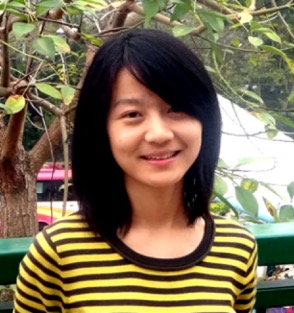Student Spotlight: Hui Jing

What is your area of research?
The Sir2 (silencing information regulator 2) family of enzymes, or sirtuins, were originally known as nicotinamide adenine dinucleotide (NAD)-dependent protein lysine deacetylase. Mammals have seven sirtuins, SIRT1-7. They have been closely implicated in numerous biological pathways and are considered as promising targets for treating several human diseases.
Our lab is interested in discovering and understanding the novel enzymatic activities of sirtuins and the protein posttranslational modifications (PTMs) regulated by sirtuins. With the knowledge about sirtuin enzyme activities, we are also interested in developing small molecule sirtuin inhibitors for therapeutic applications. Our recent findings indicate that some sirtuin acts not only as protein lysine deacetylase, but also as desuccinylase, demalonylase, or defatty-acylase. We have also demonstrated that protein lysine succinylation, malonylation and long-chain fatty-acylation are common PTMs that were previously under-recognized.
My research focuses on understanding the multiple enzymatic functions and physiological significance of SIRT2, one of the mammalian sirtuins. SIRT2 was known to be a robust deacetylase and play important roles in cell cycle regulation, stress response, metabolism and differentiation. Recently, it has been shown to be an efficient defatty-acylase. Briefly, by utilizing specific and potent SIRT2 inhibitors, I study the therapeutic potential of SIRT2 inhibition for cancer treatment. By discovering protein substrates of SIRT2 defatty-acylase and the function of corresponding long-chain fatty-acylation, I aim to better understand the involvement of SIRT2 in human cancer as a defatty-acylase.
What inspired you to choose this field of study?
As an undergraduate research assistant, I was interested in preclinical anti-cancer drug development and mechanism investigation of drug candidates. Later research experiences furthered my passion to elucidate molecular mechanisms of human diseases in the hopes that such knowledge would help us develop better prevention and treatment diseases. As I ventured overseas from China to begin my graduate studies at Cornell, I was fascinated by the power and potential of chemical biology in achieving this end—or in other words, how powerful it can be to use the principles and approaches of chemistry to solve biological problems. So I chose this field of study under the guidance of Dr. Hening Lin. And my graduate dissertation work has again demonstrated powerfully to me the exceptional ability of chemical biology in providing insight into human diseases, discovering molecular targets, and developing better therapies.
Why is this research important?
Growing evidence suggests that SIRT2 plays important roles in cell cycle regulation, stress response, metabolism and differentiation by deacetylating a wide variety of substrates. The involvement of SIRT2 in human disease—such as cancer, neurodegeneration, and metabolic diseases—has been studied and debated. Especially, SIRT2 as an anti-cancer therapeutic target has been a topic in debate. In addition, SIRT2 has been recently found to exhibit protein lysine defatty-acylase activity besides deacetylase activity. But it is not clear whether this novel enzymatic activity of SIRT2 has any physiology relevance. Therefore, my study will provide us important insights into the function of SIRT2 as deacetylase and defatty-acylase in cancer, and thus shed light on the potential of SIRT2 modulators as anti-cancer therapies.
What else has influenced your thinking as a researcher or scholar?
My mentors and fellow graduate students since college have had a great impact on me as a researcher.
I understand you recently received a Howard Hughes Medical Institute International Student Research Fellowship. Congratulations! How did you learn about this fellowship and what was the application process like?
It is a great honor for me to be a recipient of the Howard Hughes Medical Institute International Student Research Fellowship (HHMI ISRF). I learned about this fellowship through my advisor, Dr. Hening Lin and some former fellowship applicants, who gave me many valuable pieces of advice on the application.
Briefly, the application process started with a Cornell internal competition. Students in their second or third year of graduate study were first nominated as candidates for the Cornell internal selection by their thesis advisor and Director of Graduate Study (DGS). Then students would be eligible to apply for the HHMI ISRF if they were selected as one of Cornell’s allowed nominations to the HHMI ISRF program. The Cornell nominees could then submit their online applications using HHMI’s web-based competition system. More thorough application process is described on the HHMI website.
What opportunities will this fellowship provide for you that you perhaps wouldn’t have had access to otherwise?
As this fellowship is designed to facilitate the research training of international students who are ineligible for most of the fellowships or training grants in the U.S., being awarded this fellowship would be a unique opportunity for my education and training. In particular, this fellowship provides an annual allowance that can be used for travel to scientific meetings, professional fees, and other research-related events, which are all great opportunities for me to meet and communicate with the experts in related fields, extend my network, and broaden my horizon scientifically.
Any advice for other graduate students interested in applying for fellowships or grants?
For many fellowships or grants for graduate students, the most influential factor is the applicant’s research proposal. So it is critical to explain the significance, innovation, and strategy of the proposed research in a way that is both concise and accessible to non-expert, knowledgeable scientists.
Why did you choose Cornell to pursue your degree?
Pursuing a doctoral degree in Cornell’s Chemistry and Chemical Biology program provides me with great opportunity to do cutting-edge work at the boundary of chemistry and biology. The highly supportive and collaborative research environment granted by our program is also a reason why I chose Cornell.
What’s next for you?
I will be continuing my graduate dissertation research and graduating. In the long term, I hope to develop a career in chemical biology research.
Interview by Sally Kral, communications and outreach assistant in the Graduate School
